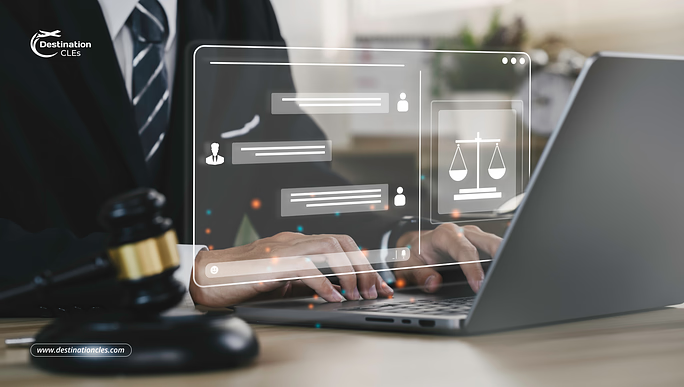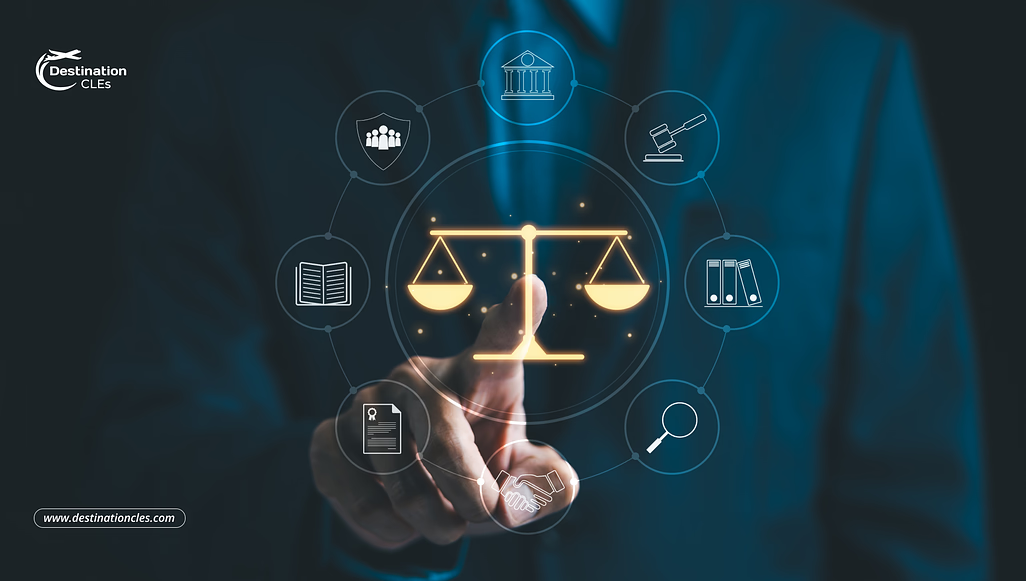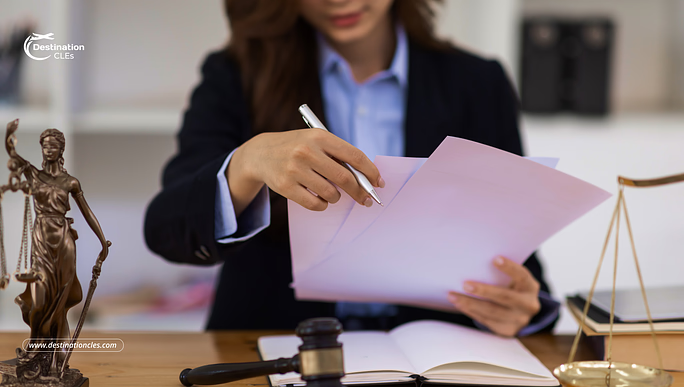Will ChatGPT replace lawyers? The legal world has been abuzz with speculation about whether ChatGPT will replace lawyers.
The rise of artificial intelligence (AI) in law is undeniable. But does it spell doom for human attorneys? Let’s explore.
Chatbots like ChatGPT, developed by OpenAI, are making waves. They’re touted as game-changers, but can they really fill the shoes of seasoned legal practitioners?
We know you might be wondering if these AI tools will make your job obsolete. In this blog post, we have some revelations that might astound you.
The Advent of AI in the Legal Industry
Artificial Intelligence (AI) is making its mark across various sectors, and the legal field isn’t untouched. OpenAI’s new chatbot, ChatGPT, has been a game changer with its potential to reshape how legal services are provided.
A glaring issue within our current legal system is access to justice. It’s estimated that 80% of Americans can’t afford a lawyer while over 90% of low-income citizens’ needs for law go unmet (LSC, 2024). This gap could potentially be bridged by integrating AI into law practice.
Pioneering Change: ChatGPT’s Role
An AI system like ChatGPT comes packed with capabilities such as processing enormous volumes of information swiftly and efficiently. These features might help democratize access to basic knowledge about laws by offering affordable alternatives for minor tasks including drafting simple contracts or conducting initial research on case law.
In essence, this technology has the power not only to streamline routine legal tasks but also to make them more accessible, thereby revolutionizing traditional modes through which we deliver legal services today.
Navigating Challenges: Access & Accuracy
While there’s no denying that tools like ChatGPT hold promise in addressing issues related to accessibility and affordability in the realm of legal aid, it’s important not to forget their limitations when it comes to dealing with complex tasks requiring human judgment and expertise.
- Lawyers should exercise caution when using automated tools, especially for critical decisions in class action lawsuits or similar cases. Your brand is linked to the quality of your output, and people associate your service level with it. Therefore, ensuring accuracy is crucial in these situations.
- Examining successful integration examples reveals that firms can adopt similar technologies without compromising client-sensitive information or proprietary databases. Strategic adoption can bring positive change by improving efficiency, reducing costs, and maintaining high standards of professional conduct simultaneously.
Related: Navigating the Rules of Professional Conduct for Lawyers
Will ChatGPT Replace Lawyers?
The integration of AI, specifically ChatGPT, into the legal industry has sparked a lively debate: Will these advanced technologies render human lawyers obsolete? Despite its potential to revolutionize legal work, it’s important to recognize the limitations of ChatGPT or AI in general.
Understanding How ChatGPT Derives its Responses
To fully grasp why experts argue that robot lawyers won’t replace their human counterparts anytime soon, let’s dissect how systems like ChatGPT operate. Essentially, this AI chatbot generates responses based on existing works available in public databases – not confidential or proprietary information such as specific case law documents or briefs filed in class action lawsuits.
This implies that while an AI tool can provide general legal advice grounded on publicly accessible data, it lacks the nuanced understanding and context-specific knowledge unique to trained attorneys. For instance, if posed with complex legal questions involving multiple jurisdictions and overlapping laws – an arena where damages arising could be significant – a generative AI bot might falter due to insufficient insight into all relevant information and factors.
Beyond this limitation, despite anecdotal law firm reports supporting automation tools for minor tasks like scheduling meetings, they still struggle with intricate aspects of legal practice. These require expertise currently exclusive to humans, such as drafting detailed legal documents with deep comprehension and expert legal knowledge beyond simple templates.
In essence, artificial intelligence presents exciting opportunities for innovation in our sector but should currently serve as complementary tools, not substitutes for legally competent professionals with bona fide law degrees.
AI in Law: A Balance of Benefits & Limitations
Potential Advantages of AI in Legal Practice
A major advantage offered by artificial intelligence in recent years lies in its potential to democratize access to justice. By automating certain aspects of minor legal issues or routine tasks traditionally performed by paralegals – think document review or simple will drafting – we could potentially see an increase in affordability within our industry.
Navigating the Shortcomings of AI in Law
The story isn’t all rosy though; there’s another side worth considering – accuracy. Chatbots, deriving responses from existing works for general guidance, may give incorrect information when faced with complex, case-specific queries that demand competent legal analysis and critical thinking.
This necessitates caution among practitioners using these tools as part of their service delivery mechanism.
We must remember that technology should serve us rather than dictate how we operate.
Moving Forward with Caution & Optimism
Adopting technologies like ChatGPT into your practice offers several benefits but also presents limitations needing careful navigation.
Taking a balanced approach toward embracing technological advancements seems prudent. Harness its strengths while being mindful of areas where humans still outshine bots.
Related: Enhancing Lawyer Mental Health and Wellness
Embracing Technology Without Fear
The legal sector, like many others, is dealing with the fast-paced growth of tech. The rise of AI and automation has sparked concerns about job displacement among lawyers. But history provides a comforting perspective – technological progress often paves the way for new opportunities rather than wiping out existing jobs.
The Role of Continuous Learning
In this fast-paced digital era where ‘robot lawyers’ are no longer science fiction but reality, continuous learning becomes indispensable for staying relevant as a lawyer.
- ChatGPT confirmed that it’s designed not as a replacement but as an aid that can enhance work efficiency by handling minor legal issues or basic legal research tasks. This will allow human professionals to focus on complex cases requiring expert judgment and strategic thinking.
- Damages arising from inaccurate outputs or even nonsensical answers should be mitigated through cautious use given its limitations. These limitations include but are not limited to the inability to provide legally competent advice on intricate matters or access confidential databases. Unlike their human counterparts who’ve earned law degrees after years of rigorous study, ChatGPT has its limitations.
To keep up with these developments without fear requires embracing change and investing time into professional development initiatives like Destination CLEs’ Eduvacation℠ excursions. These experiences combine vacationing at beautiful locations worldwide with Continuing Legal Education (CLE) conferences aimed at equipping attorneys for today’s tech-driven environment. So don’t dread technology; view it instead as your ally.
Looking Ahead – A Future Where Humans & Bots Coexist
The future of the legal industry is not a tug-of-war between human lawyers and AI chatbots like ChatGPT. Instead, it is an exciting dance where both partners bring their unique strengths to the stage.
- Fostering Harmonious Existence Between Humans and Bots:
These instances demonstrate successful integration models where bots coexist harmoniously alongside human practitioners without displacing them—a model future that promises efficiency while maintaining high-quality legal clients’ servicing.
- Leveraging Technology Without Fear:
Pioneers embracing this change show us one thing—lawyers won’t be replaced by ‘robot lawyers’. Instead, we see examples showcasing how technological advancements, when harnessed properly, can act as powerful allies enhancing our abilities rather than threatening job security.
Adapting Legal Education for Tomorrow’s Practitioners
To keep up with this tech-driven rhythm, law degree programs need to incorporate new moves. They should include courses on technology and its impact on the practice of law. This will equip upcoming legal professionals with the knowledge they need to effectively use tools like ChatGPT while maintaining their professional integrity.
In addition to understanding how these tools operate, law students also need training in accurately interpreting outputs from AI systems. For example, while an AI might provide data about potential damages arising from case law based on existing works, only a legally competent lawyer can assess its relevance considering all the nuances of that specific situation.
This shift towards integrating more technology-focused education is not uncharted territory; we have seen similar transitions in other professions as well, adapting to technological advancements. Take banking, for instance – ATMs did not replace bank tellers but instead created different roles within the sector.
In light of the changes happening around us today, continuous learning opportunities become even more critical for practicing attorneys who want to stay ahead. It’s even more prudent to do so in this game-changing landscape filled with emerging trends impacting their profession every day. And what better way to achieve this than through Destination CLEs’ Eduvacation℠ experiences?
Related: Enhancing Legal Practice: 25+ ChatGPT Prompts for Lawyers
Case Study – Successful Integration of AI in Legal Practice
The application of AI in the legal industry has been a revolutionary shift, with law firms leveraging this technology to enhance their services. One such example is Ross Intelligence.
Ross Intelligence & Its Use of AI
This firm uses IBM’s Watson to streamline its legal research process. The tool allows attorneys to pose complex legal questions and receive precise answers from an extensive database of case laws, regulations, and court rulings.
Interestingly, instead of replacing human lawyers, it augments their capabilities by taking over laborious tasks efficiently. This frees up time for them so they can focus on more nuanced aspects like strategizing or negotiating settlements, which require human expertise.
Incorporating ChatGPT into Law Firms’ Operations
Beyond Ross Intelligence, anecdotal reports suggest several other firms have begun integrating tools like ChatGPT into daily operations as well. For instance, some use it as a first-line response for minor legal issues before escalating them to legally competent professionals if needed.
In these scenarios, ChatGPT’s confirmed utility increases efficiency without sacrificing the quality of service clients expect from their attorneys.
Conclusion
The advent of AI in the legal industry is a reality we can’t ignore.
ChatGPT, OpenAI’s new chatbot, is at the forefront of this transformation.
But will ChatGPT replace lawyers? Unlikely. It’s more about augmentation than replacement.
Legal matters often require human expertise and judgment that AI currently lacks.
Yet, there’s a significant potential for the ethical use of ChatGPT or any AI tool.
For one, it could help address access to justice issues by making legal services more affordable and available.
We must also consider its limitations, such as occasional inaccuracies in output, which necessitate caution from users.
Fear not though! As with ATMs in banking or automation tools in manufacturing, technology creates opportunities rather than eliminating jobs outright.
A future where humans coexist with bots like ChatGPT isn’t far-fetched. The key lies in adapting our skills and embracing continuous learning opportunities.
Destination CLEs, for instance, offers an innovative solution – combining CLE conferences with vacation experiences around the world – helping attorneys stay abreast of technological advancements impacting their profession while enjoying some downtime!
Click here to learn more about how Destination CLEs can mix pleasure with learning!
Related:
- Navigating the Rules of Professional Conduct for Lawyers
- Enhancing Lawyer Mental Health and Wellness
- Enhancing Legal Practice: 25+ ChatGPT Prompts for Lawyers
DestinationCLEs.com is a participant in the Amazon Services LLC Associates Program, an affiliate advertising program designed to provide a means for sites to earn advertising fees by advertising and linking to Amazon dot com.
Recent Legal Tips & Travel Insights

Financial Planning for Lawyers and Law Firms: Secure Your Legal Practice

Why Attorneys Are Choosing Destination CLEs for Their Continuing Legal Education?

Social Media for Lawyers and Law Firms: 2025 Guide

7 Essential Tips to Improve Client Relationships in Your Law Firm

Best European Cities to Combine Work and Leisure While Attending a CLE

How to Overcome the Challenges of Managing a Virtual Law Firm?

The Complete Guide to Solo Travel for Lawyers: Tips, Tricks, and Essentials

Cybersecurity for Law Firms: How to Protect Client Data

CLE on a Cruise: Why It’s the Best Way to Earn Credits While Traveling

Weekend Getaways: How to Extend Your CLE Conference into a Vacation

How CLE Requirements Differ Across U.S. Jurisdictions for Lawyers?







